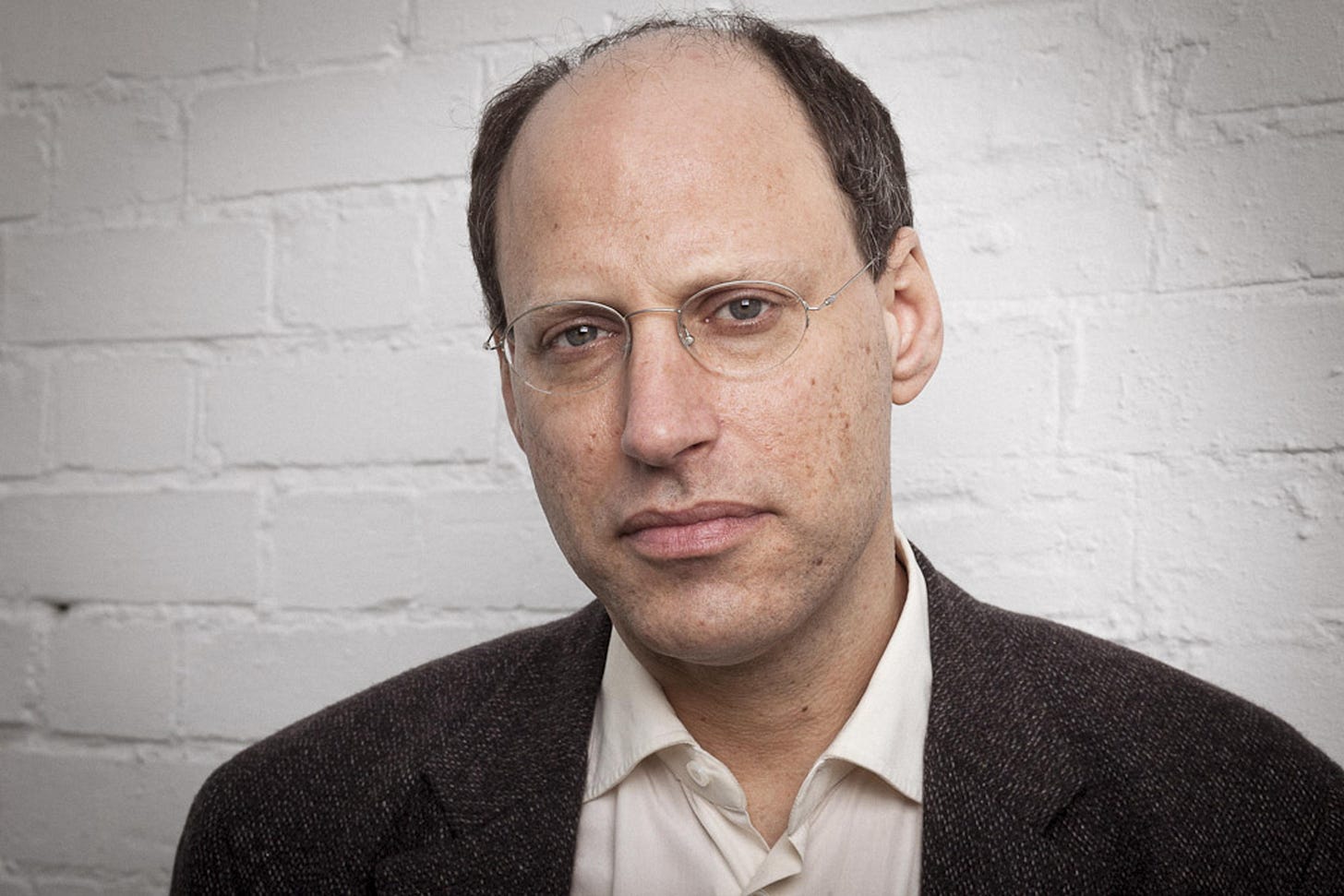Dear Readers, I am holding a flash sale this week.
Yearly memberships will be priced at £35.00
That works out at just under £3.00 a month.
My dispatches will always be free and open to everyone. If you have the means and believe in paying for good writing, please consider becoming a paid subscriber. Your contributions go towards my care.
Below, a contribution from my dear friend Darian Leader, who has been so supportive this last year.
Recent statistics that the French are having less sex today than some twenty years ago have been taken to suggest an overall decline in sexual behaviour. Teenagers, we are told, are also less likely to have sex than before, and a whole host of new labels have appeared to designate those who prefer to avoid the more physical aspects of sex with others: Touch Me Nots, Aces, Aegosexuals, Fraysexuals, Autosexuals, Orchidsexuals…
Do the figures and the ramification of new terms indicate a shift in our attitude to sex or, on the contrary, do they simply make visible anxieties and fears that have always been part of our relation to sexuality?
Surveys, of course, are not always reliable, and sex is probably the one area of human activity where people are prone to lie, exaggerate or plain misinform. In the late 1940s, Kinsey found that the average length of pen-vag sex was just less than two minutes, yet in Morton and Bernice Hunt’s wide-ranging survey of 1973 this had become twelve minutes, not including foreplay!
Recent figures set the clock back to less than five minutes, so either we need to hypothesize a bizarre and temporary biological change in the human species in the early 70s or, more likely, see in the inflated figures a reflection of the new social emphasis on performing and evaluating. How we answer the questions about sex will be shaped by social forces and not just individual egos.
The statistics on the actual frequency of sex encounter the same problems, and there are marked cultural and geographical variations, yet a feature that recurs again and again is the surprise of researchers that sex occurs less often than we imagine it to.
Starting with Kinsey in the 1940s, and moving through the 1970s to the mid-90s, the surveys always show that people are actually having far less sex than was expected. The media stories at the time echo the same nonplussed reactions: are people having less sex? Has our culture changed? What could account for this new disenchantment?
The most obvious point here is that what the surveys show is not that sexual habits have changed, but that our expectations about these habits stay the same. Sex is something that we think is going on all the time, and when we find out that it isn’t, we assume something must be wrong rather than just recognise that, well, it doesn’t happen all the time.
Culture of course reinforces these beliefs. TV shows, movies and pornography show people having sex either continuously or at the outcome of an adventure or pursuit. Where TV and movies tend to focus on the obstacles that need to be overcome in order to finally have sex, porn does away with the obstacles and mostly just depicts the acts.
Porn here is very similar to scientific studies of sex, where human attachments are discounted or ignored. People don’t decline sex due to prior commitments or loyalties, in the same way that those who don’t want to have sex won’t be included in the scientific experiment. Sex becomes a simple operation on the convex and concave surfaces of a human body. Everyone is doing it, no one says No, or Not Now.
In real life, of course, people say No or Not Now all the time, yet this is perhaps not always a simple rejection of sexuality. As the Church has been aware for centuries, the renunciation of carnal pleasures can itself be a carnal pleasure, and the void created by sacrifice and refusal can offer its own kind of sexual satisfaction. The writings of the mystics are quite clear on this.
Desire in general prefers to be unfulfilled, and the tension, hunger and striving it generates constitute a form of satisfaction, as Freud and later psychoanalysts all recognised. The efforts towards our object of desire take up a vast part of human energy, and if we ever happen to catch up with it, we may feel disappointment and a sense of loss. Athletes who break a record or lottery winners often experience depression after reaching their goal: now, there is no goal left.
But why is sex itself so frequently identified with a - or The - universal human goal here? Why does sex seem to so many to be the ultimate human achievement and purpose, the most meaningful of all human activities?
An obvious answer invokes childhood experience. Sex is something children cannot do: it is reserved for the grown-ups, just as all manner of bodily feelings and practices are sanctioned as forbidden. Kids learn early on not to touch parts of their body, not to speak about them and even not to think about them. Having a body means knowing that parts of it are off limits. And what’s off limits tends to become what we become most interested in…
Sexuality is this contradictory, uneven space where we sense the judgement of our parents and caregivers even before we might understand what exactly these judgements are about. If a child’s hands are moved away from its genitals, it will register the negative response but will not know why it is elicited. Sexuality emerges together with guilt, in this atmosphere of mostly negative judgement and incomprehension.
Added to this is the fact that as we grow up, we have to give up the bodily proximity we may have enjoyed with our caregivers. They will no longer hold us, caress us, soothe us as before, and the pain generated by this loss is difficult to quantify. Touch and love are often soldered together here, to create a false equation: we search for love through touch, as if the physical dimension of sex in later life will allow us to access the love we might once have experienced – or sought to.
Sex becomes a kind of reminder of love, and that’s one of the reasons why it is so often followed by disappointment, anger, or a sense of loss, as well as, at other times, a feeling of gratitude and intimacy. It comes to stand for everything we have lost.
The way that our sexual bodies are forged through negative judgment and guilt illuminates both what happens in sex and why we might shy away from it. Although it was once believed that people have sexual phantasies to compensate for not having actual sex, it was widely recognised by the 1970s that almost everyone has phantasies during sex in order to create and then sustain arousal. These phantasies often involve scenarios of coercion and forced submission, even if the person may have little interest in playing out such scenes in real life. So why the phantasies?
Being forced to engage in sex in phantasy allows a way out of the impasse of guilt. If the responsibility for the sex is entirely on the side of the aggressor, pleasure can be separated from guilt – ‘It’s not my choice, it’s the other person’s’. In her famous survey of sexual phantasies, Nancy Friday observed how frequently phrases like ‘I then had to..’ or ‘He made me..’ occurred, as if to remove or distance guilt.
This also helps to explain another equally common phantasy, that of a third party. This is often taken to mean that the partner is imagined to be someone else in bed, perhaps to ignite a desire extinguished by familiarity. But it is actually just as common to imagine oneself as another person. If we are someone else, after all, we don’t need to feel responsible, in the same way that imagining oneself as a prostitute or erotic dancer allows the same separation – ‘I’m just doing my job’. Even when children play sex games, they introduce social roles to remove responsibility’: ‘You be the doctor and I’ll be the patient’.
This splitting of oneself (or one’s partner) is in fact so frequent that there are even gags about it. A couple are in bed, one turns to the other and says ‘How about it?’, to receive the reply, ‘Sorry, I’m just too tired to think about anyone else’.
The effort to separate responsibility from pleasure can certainly take another pathway: an avoidance of sex altogether. Romance and love have their charms, and tend to be deemed acceptable by society, so many people stop there. The sexual consequences of love are left unexplored, and often for good reason.
When we first learn about sex in childhood, curiosity may be mixed with horror and panic. Can one body really fit inside another? How is that even possible? Doesn’t it cause damage? How can anyone find that pleasurable? How do bodies survive sex?
These early anxieties gradually become treated with the sexual scripts transmitted by the family, one’s peers and society. We are told what to do and when and with whom – so we learn what is expected of us, with all the prejudice and gender stereotypes that this usually involves.
The immense feeling of relief that people feel after sex may reflect this process: we have survived! Some terrible calamity has been avoided! Note how the words used for centuries to describe sex almost always also refer to cheating or dodging: to screw, to ream, to diddle, to fuck, to trick, to jape. We’ve succeeded in cheating fate!
Given the catalogue of terrors that sex involves, avoiding it is thus perfectly logical and reasonable. What the new efflorescence of labels to name this avoidance does is to make not having sex part of the cultural script. This means that the early anxieties aren’t shoehorned into behavioural patterns that conflict with them: we don’t have to do anything, and this is ok.
It might be objected that not having sex is simply a choice, not based on any underlying fear or anxiety. At one level, this can of course be true, but perhaps all sexual orientations are based on fear, even if we are unaware of this. Having a lot of sex or having little or none can all be ways of treating anxiety. The curiosity, fascination and sometimes outright hatred and hostility that different sexual behaviours produce is testimony to this.
We should welcome the new terms and their multiplication, as they may help to destigmatise alternative modes of sexuality and foster a sense of recognition and acceptance. The more that different orientations are named and validated, traditional heterosexual norms can be sapped of their monopolising power.
The risk, of course, is that the new labels become commodified, reified into entities that can then become norms which one might fail to satisfy, as has often been the case historically. At the moment, the sheer pace of creating these labels works against this, so let’s hope that the multiplication continues!
Leader’s latest book, Is It Ever Just Sex?, published by Penguin, is available to buy here.






Maybe the species has some innate wisdom- this is not a good time to procreate. Once whatever-it-is-that-is-going-to happen has happened, then everyone will be very into it again.
Two minutes? No wonder there was a feminist revolt! :)